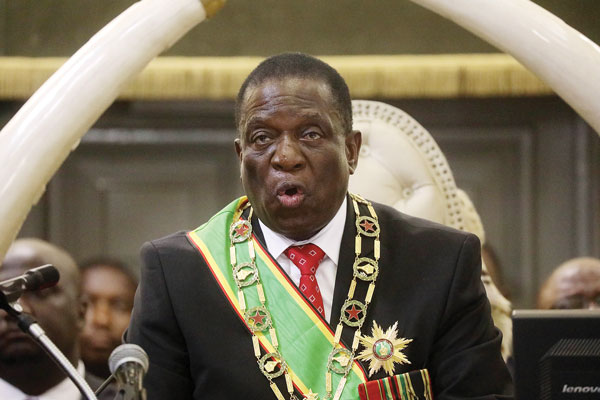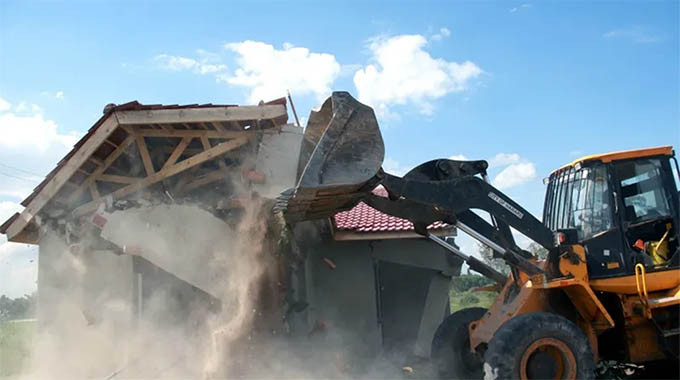
PRESIDENT Emmerson Mnangagwa yesterday imposed a dusk to dawn curfew from today aimed at combating the coronavirus outbreak and warned that security forces would enforce the new measures.
By Blessed Mhlanga
This came as Zimbabwe’s COVID-19 cases reached 1 820, with 26 deaths.
But critics accuse the President of using the outbreak to silence dissenting voices after the arrest on Monday of two prominent critics ahead of planned street protests against his failing government next week.
Journalist Hopewell Chin’ono and opposition official Jacob Ngarivhume are likely to appear in court today after their arrest on Monday on charges of “incitement to participate in public violence,” and police yesterday searched their homes looking for evidence for the alleged crime.
In a televised address yesterday evening, Mnangagwa said he was introducing measures that would effectively curtail the freedoms of many Zimbabweans for their good.
“These urgent measures mean curtailing the freedoms we had grown accustomed to. From now on, these freedoms stand suspended and deferred in the interests of all of us,” Mnangagwa said.
“Indeed, in the interests of our children, our nation must survive, thrive and prosper beyond this pandemic.”
- Chamisa under fire over US$120K donation
- Mavhunga puts DeMbare into Chibuku quarterfinals
- Pension funds bet on Cabora Bassa oilfields
- Councils defy govt fire tender directive
Keep Reading
But many Zimbabweans feel that life has gotten harder since Mnangagwa took over from the late Robert Mugabe, who was removed from power by his military chiefs in a November 2017 coup.
Chin’ono was among critics who exposed endemic State corruption by Mnangagwa, his family and close friends.
But Mnangagwa said: “No responsible government places its citizens in harm’s way, hence my government will do all it can to preserve the right to life.
“Accordingly, government has decided on the following measures which take full effect from tomorrow (today), until further review and notice.”
All unemployed persons will not be allowed to move around except when fetching food, and all streets should be empty with people ensconced in their homes as Mnangagwa’s 6pm to 6am curfew takes root.
“All non-working sections of our population will be required to stay at home except for purposes of securing food, water and health services,” he said.
“Where travel and social contact becomes essential and inevitable, every Zimbabwean should and must uphold the full requirements set out by WHO (World Health Organisation). All business premises must operate from 8am until 3pm with the exception of providers of essential services.
“All our security services must enforce a dusk to dawn curfew set to come into force (today and run) daily between 6pm to 6am. Only essential services are exempt to this curfew, all business operations and premises are required to observe and enforce WHO anti-COVID-19 standards.”
Mnangagwa said only registered SME’s which have been allocated workplaces will be allowed to operate.
“Our food markets will remain open and operational and must observe set measures, rules and requirements meant to uphold public health. Market suppliers should be facilitated to reach the markets, including by our security personnel.”
Mnangagwa also sealed off towns and cities, saying no buses would be allowed to ferry people from town to town or into rural areas. He also banned all public gatherings, including political activities.
“Intercity and town public travel and non-essential travel to all rural areas remain banned. Public gatherings for social and political activities remain banned, funeral gatherings remain curtailed in line with public health regulations,” he said.
MAJOR HIGHLIGHTS
Business to operate between 8AM to 3PM, with the exception of providers of essential services
There is a curfew between 6PM-6AM, only essential services exempted.
All non-working sections of the population should stay at home.
Intercity travel banned, where travel is essential, full requirements and regulations such as wearing masks, hygiene and social distancing must be observed.
Only registered SMEs will be allowed to work.
Anyone who knowingly infects or puts others in danger of infection would be liable to criminal prosecution.
Religious and public gatherings are banned while funerals remain curtailed.
It is now criminal to run away from quarantine centres.











